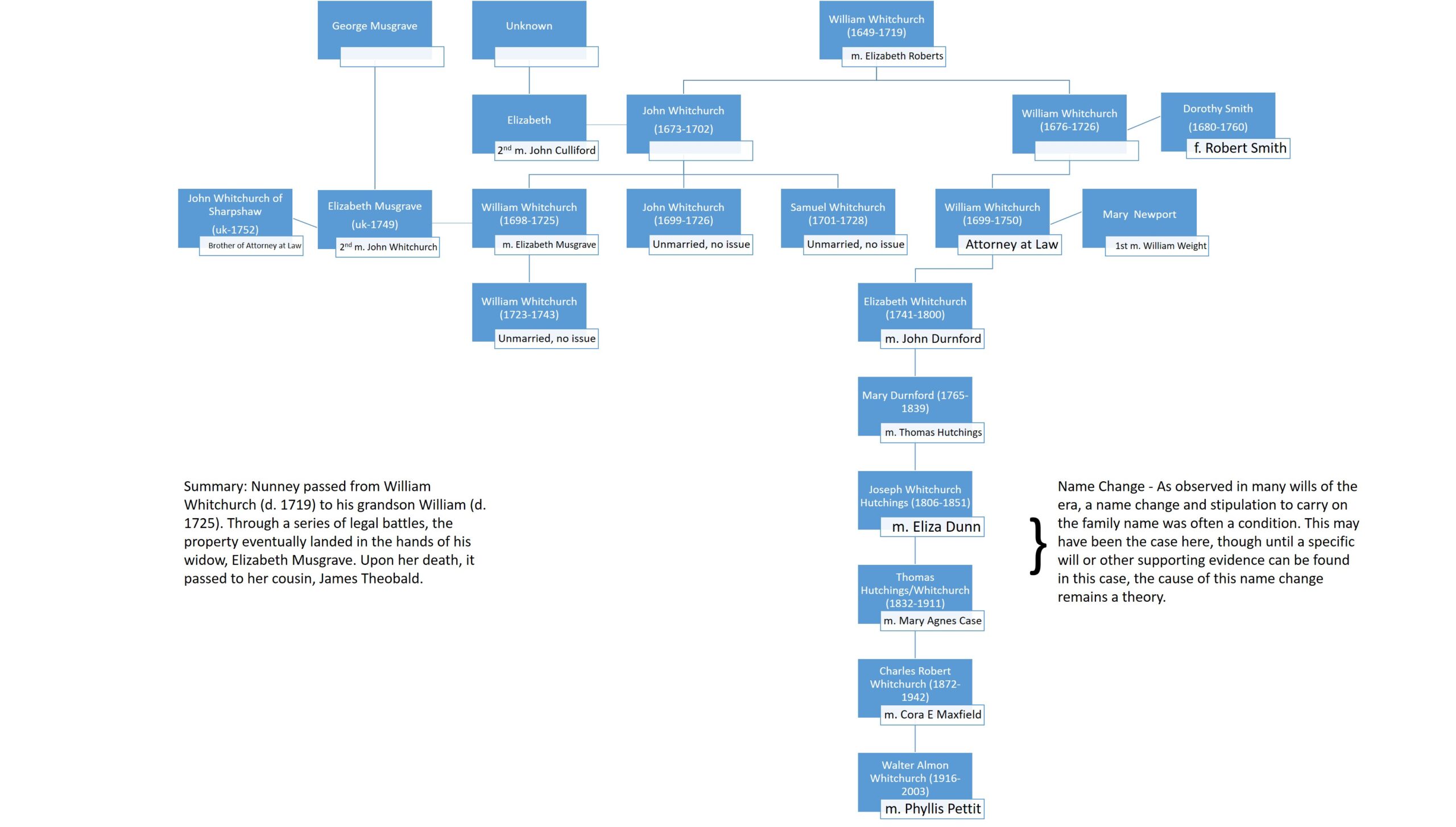The Whitchurch connection to Nunney Castle is not that complicated when you put it in a visual context. It goes back, directly, to William Whitchurch of Frome Selwood, Somerset, who was apparently the High Sheriff of Somerset in the year 1691.
William, who married Elizabeth Roberts, had two surviving sons, John and William, who had issue:
- John married Elizabeth (maiden name unknown, but there is mention of the family surname “Gould” in some documents) circa 1697. John died a young father in 1702, and Elizabeth remarried to John Culliford of Dorset in 1703. Before John’s untimely death, the couple had three sons: William, John and Samuel:
- William became whole and sole Executor of his grandfather William’s will and inherited the lands in Nunney in 1719-1720. He married Elizabeth Musgrave and the couple had only one son before he also died a young father in 1725. Elizabeth remarried to John Whitchurch of Sharpshaw in 1732.
- William, the only son and heir of William and Elizabeth, died unmarried and without issue at St. Gabriel London in 1743, probably having just become of age. He mentions his grandmother Elizabeth Culliford in his will, who was still alive at that time. The remainder of all his lands and inheritance he left to his mother.
- John died unmarried and without issue at Nunney Castle in 1726.
- Samuel died unmarried and without issue at Nunney Castle in 1728.
- William became whole and sole Executor of his grandfather William’s will and inherited the lands in Nunney in 1719-1720. He married Elizabeth Musgrave and the couple had only one son before he also died a young father in 1725. Elizabeth remarried to John Whitchurch of Sharpshaw in 1732.
- William married Dorothy Smith and had numerous children. Our Whitchurch line descends from their son, William Whitchurch, attorney at law. (Learn more about William here.)
When Elizabeth (Musgrave) Whitchurch remarried to John Whitchurch of Sharpshaw in 1732, she was living in Salisbury, Wiltshire, and he was living at Symonds Inn in London. It is unclear why she had left Nunney Castle at that point, but there is evidence of multiple litigation events regarding Nunney Castle and Nunney Mawdley, all of which requires more research to understand the details, sequence of events and outcomes. It does appear that most if not all judgments were eventually in favor of Elizabeth, since ultimately she retained administration of the castle/lands until her son came of age, and had whole and sole authority over them in her will proved in 1749.
Records show that Elizabeth and her second husband, John of Sharpshaw, had a troubled marriage, and that he mistreated her. Even so, Elizabeth initially left Nunney Castle/Mawdley to her husband John in her will for the term of his natural life, then to pass to William, the son of William, attorney at law (bypassing the elder William “as if he were dead”). But then suddenly in a codicil, she revoked these legacies and left everything to her cousin, James Theobald. In lieu of the lands, she did leave young William a substantial amount of money when he came of age. I suspect this was because it was right about this time that William, attorney at law was incarcerated at Fleet Prison and his son was only about ten years of age. As a minor, his assets would be under the control of his parents, and putting Nunney under the control and administration of James Theobald was the only way to protect it from William’s creditors.
After research of litigation documents in the archives, it turns out that John Whitchurch of Sharpshaw was the younger brother of William Whitchurch attorney at law. This was suspected all along, as in his will of 1752, he named his nephew, William Whitchurch, son of his late brother William Whitchurch deceased, which is in alignment with him belonging in this place of the family.
And that is how Nunney Castle passed out of the Whitchurch family name, but not so fast…James Theobald was married to one Elizabeth Whitchurch. I don’t yet know where she fits into the family puzzle but it’s an interesting plot twist…
While Nunney may have passed out of the Whitchurch name, it doesn’t appear to have strayed from the family itself too far. The Nunney property passed down from James to James’ son, James Theobald, who was married to Jane Harriot Blechynden. William Whitchurch, the son of the attorney at law who was to receive Nunney before it went to James Theobald, had a son (also named William) who grew up to marry Jane Harriot Blechynden’s niece Charlotte. So it seems it all stayed in the family after all, if not in name at least in relationships.
UPDATE 2025: The Elizabeth Whitchurch mentioned in the previous paragraph was the daughter of James Whitchurch and Elizabeth Scrope. James was the son of Leonard Whitchurch and his wife Jane. Leonard was one of the seven sons of Samuel Whitchurch and a brother of William Whitchurch, the progenitor of this family.
